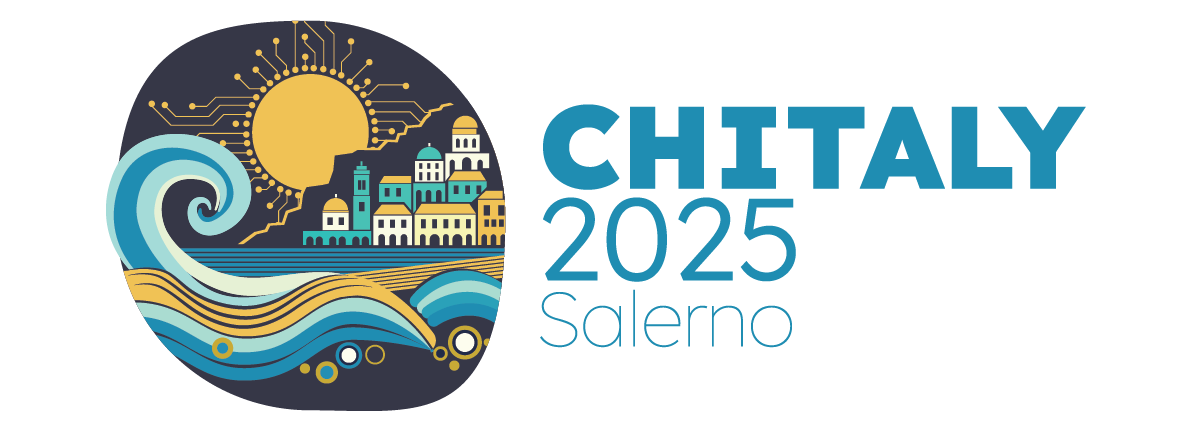Call for Papers
The theme of the 16th Biannual Conference of the Italian SIGCHI Chapter (CHItaly 2025) is “Technologies and Methodologies of Human-Computer Interaction in the Third Millennium”. It invites us to reflect on how technological advances continue to redefine our interactions with the digital world.
Over the last two decades, the field of Human-Computer Interaction (HCI) has evolved rapidly, adapting to innovations that have transformed everyday life. Integrating Artificial Intelligence, Augmented and Virtual Reality, Robotics, voice interfaces, wearable devices, and the Internet of Things has brought HCI to the forefront of scientific inquiry, offering novel possibilities and complex challenges. These technologies are not only changing how we use digital systems but also influencing the ways we think, learn, communicate, and interact on a personal, social, and organizational level.
This year’s conference aims to inspire a comprehensive dialogue on how these technologies are reshaping the landscape of HCI and redefining the boundaries of human capabilities. Participants will be invited to engage with questions surrounding ethical implications, accessibility, inclusivity, user experience, and the sustainability of emerging technologies. The theme encourages contributors to share insights on methodologies that adapt to these changes, from user-centred design practices to innovative evaluation methods for complex, adaptive systems.
We invite submissions of research papers, both long and short, that contribute to the field of Human-Computer Interaction (HCI).
- Long Papers: These should present original, substantial research that advances HCI. Submissions must provide sufficient methodological and technical detail to ensure thorough scrutiny and reproducibility. Results should adhere to established scholarly standards, and authors are expected to discuss explicitly the implications of their findings for the field.
- Short Papers: These should introduce innovative or thought-provoking research, or novel applications within HCI. Evaluation will focus on the originality and relevance of the work rather than on comprehensive technical validation or extensive research studies.
Paper Topics
CHItaly 2025 welcomes contributions on a broad range of research topics within the field of human-computer interaction, including but not limited to the following.
Emerging Technologies for HCI
- AI-based systems for human interaction
- Conversational AI and voice interfaces
- Personalization and predictive interaction
- Immersive experiences and virtual environments
- Social and humanoid robots
- Design and usability in human-robot interaction
- Biometric sensors and wearable technology
- HCI for wellness and healthcare
- Distributed interactions among intelligent systems
- Automation and smart home technologies
Innovative Methodologies for HCI
- Co-design and participatory design
- End-User Development
- Designing for diverse and inclusive groups
- Usability testing for complex systems
- Metrics for immersive and adaptive experiences
- Behavioural analysis and predictive modelling
- AI-based adaptive systems
- Storytelling and engagement in interaction design
- Designing multisensory interactions
Ethics and Sustainability in HCI Technologies
- Accessibility for users with disabilities
- Guidelines for universal access
- Designing for cultural and social diversity
- Eliminating biases in AI systems
- Data privacy and security
- Awareness and transparency in technology usage
- Environmental impacts of technologies
- Sustainable design and energy-efficient solutions
Social and Organizational Impacts of HCI
- Technologies for remote collaboration and communication
- Effects of digital platforms on human relationships
- Interactive environments for education and learning
- Adaptation of AR/VR in learning contexts
- Integration of technologies in enterprises
- Impacts on productivity and decision-making processes
New Frontiers in HCI
- Brain-Computer Interfaces (BCI)
- Cognitive stimulation through HCI
- Haptic and olfactory technologies
- New sensory dimensions for user experiences
- Redefining human capabilities through technology
- Cyborgs and human enhancement
Long and Short Paper Deadlines*
- Submission:
April 21, 2025EXTENDED to May 15, 2025 - Review notification:
June 14, 2025EXTENDED to July 02,2025 - Initial Camera-ready: July 7, 2025
- Final Camera-ready Submission: July 31, 2025
* Please, note that all deadlines follow the Anywhere on Earth (AoE) time zone, meaning submissions are accepted until the end of day D in AoE.
Review Process
All paper manuscripts must be in English. All manuscripts must be anonymous, avoiding to include information (authorship, acknowledgements, name of application or software or project) suggestive of the identity of the authors; it will be added later, to the camera ready versions, in case of acceptance.
Accepted papers will be included in the Conference Proceedings and published in the ACM Digital Library within the International Conference Proceedings Series. Authors of accepted papers are required to submit a final, camera-ready version in ACM format ahead of the conference. Additionally, authors of selected high-quality papers will be invited to submit extended versions for potential publication in special issues of leading international journals.
Paper Format and Submission Guidelines
All paper submissions must be prepared in English, and authors are required to use the ACM single-column submission template for all submissions. The recommended page limits are as follows:
- Long Papers: A maximum of 10 pages(*) for long papers, excluding references
- Short Papers: A maximum of 6 pages(*) for short papers, excluding references
(*) page limit is in terms of double column format.
ACM single-column submission templates are available for both Word and LaTeX:

Word Template
Microsoft Word is a word-processing program that allows for the creation of simple and complex documents.
LaTeX Template
LaTeX is a document preparation system and markup language widely used for creating professional/quality documents.
If you choose to use LaTeX, follow the instructions under the section “The ACM Article Template: Using LaTeX“. For complete guidelines on ACM formatting, please consult the ACM website. Submissions must be uploaded in PDF format via Easy Chair.
Important note to authors about the new ACM open-access publishing model
ACM has introduced a new open-access publishing model for the International Conference Proceedings Series (ICPS). Authors based at institutions that are not yet part of the ACM Open program and do not qualify for a waiver will be required to pay an article processing charge (APC) to publish their ICPS article in the ACM Digital Library.
To determine whether or not an APC will be applicable to your article, please follow the detailed guidance here: https://www.acm.org/publications/icps/author-guidance.
Further information may be found on the ACM website, as follows:
Full details of the new ICPS publishing model
Full details of the ACM Open program
Please direct all questions about the new model to icps-info@acm.org.
* Select the “Long Papers” track to submit a Long Paper OR Select the “Short Papers” track to submit a Short Paper
Transparency and ethics
Transparency in research is a priority for CHItaly submissions, as it enables reviewers to thoroughly evaluate the work and provides the research community with a foundation for further study. Accordingly, research transparency is rigorously considered during the review process.




